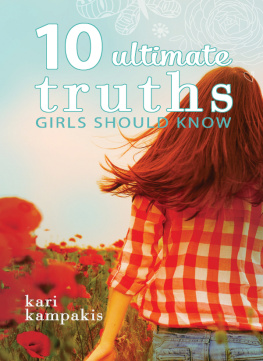Kari Ojala - The Engineers Cookbook
Here you can read online Kari Ojala - The Engineers Cookbook full text of the book (entire story) in english for free. Download pdf and epub, get meaning, cover and reviews about this ebook. year: 2015, publisher: Klaava Media, genre: Children. Description of the work, (preface) as well as reviews are available. Best literature library LitArk.com created for fans of good reading and offers a wide selection of genres:
Romance novel
Science fiction
Adventure
Detective
Science
History
Home and family
Prose
Art
Politics
Computer
Non-fiction
Religion
Business
Children
Humor
Choose a favorite category and find really read worthwhile books. Enjoy immersion in the world of imagination, feel the emotions of the characters or learn something new for yourself, make an fascinating discovery.
- Book:The Engineers Cookbook
- Author:
- Publisher:Klaava Media
- Genre:
- Year:2015
- Rating:4 / 5
- Favourites:Add to favourites
- Your mark:
- 80
- 1
- 2
- 3
- 4
- 5
The Engineers Cookbook: summary, description and annotation
We offer to read an annotation, description, summary or preface (depends on what the author of the book "The Engineers Cookbook" wrote himself). If you haven't found the necessary information about the book — write in the comments, we will try to find it.
The Engineers Cookbook — read online for free the complete book (whole text) full work
Below is the text of the book, divided by pages. System saving the place of the last page read, allows you to conveniently read the book "The Engineers Cookbook" online for free, without having to search again every time where you left off. Put a bookmark, and you can go to the page where you finished reading at any time.
Font size:
Interval:
Bookmark:
The Engineer's Cookbook
ISBN 978-952-5901-46-7 (EPUB)
Foreword
What does the engineer eat?
The engineers mindset
The engineer knows how
What and how does the engineer cook?
The engineers diet
Seasonal foods locally
The engineer out shopping
A good meal
The engineer as a host
The engineers kitchen
The engineer and appliances
Cutlery and utensils
Setting the table and etiquette
Cooking
Spices
Measurement
Timing
Orderliness
Storing food
Breakfast
Starters
Main courses
Side portions
Desserts
Snacks
Table drinks
Hot drinks
Cooking in special circumstances
Foods to avoid
The engineer eating out
Recipes
Baked fish
Beef Lindstrom
Blins
Breaded fish
Buns
Cabbage rolls
Chicken stew
Christmas ham
Curry
Fish casserole
Fish soup
Kebabs
Lemon chicken
Meat loaf
Meat or sausage soup
Meat pies and doughnuts
Mushroom sauce
Mussels
Omelette
Pancakes and crepes
Pasta sauce
Prawn salad
Prawn starter
Puff pastries
Quark pie
Quick meal
Risotto
Roast pork
Salad
Skewered mixed grill
Stir fry
Strawberry cake
Stuffed peppers
Acknowledgements
About the author
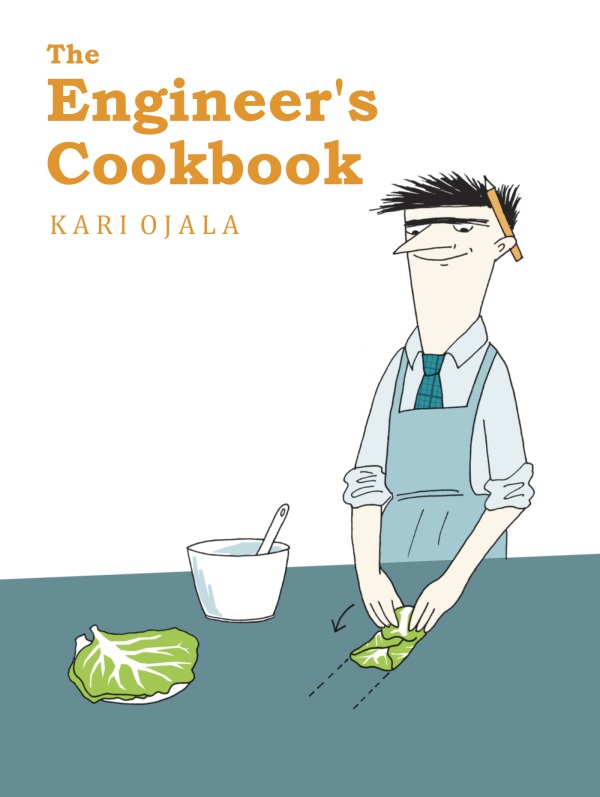
Kari Ojala
Illustrations: Helena von Alfthan
Translation: Tarja Dibaja
Cover: Jussi Vuori
Layout: Jukka Nyfors
ISBN 978-952-5901-46-7 (EPUB)
Copyright 2013 Etukeno Oy
January 2013
Second English Edition
Etukeno Oy
www.etukeno.fi
Publisher Klaava Media
www.klaava.com
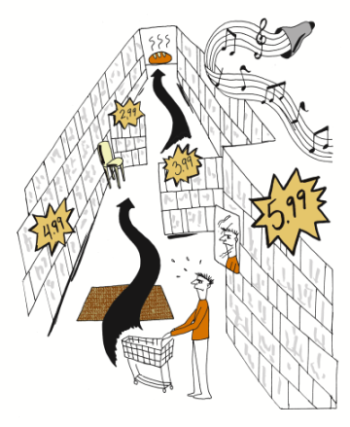
There is a good-natured battle of wits between the engineer and the grocer. The engineer would prefer to follow the so-called boomerang model, which is to pick up what he needs and hurry back home. The grocer entices him deeper into the shop and tries to stop or slow the engineer down so that he would be excited to buy more.
The engineer is an informed consumer. He votes with his feet, or really his wallet. A good product will bring him back for more, and good service will make him a regular customer. Overpriced is never ok, and he is never sold a defective product twice. Try deceiving him, and he will kick up a fuss.
Out shopping, the engineer represents the consumer economy. He believes that one of the roles of the customer is to advance the market system by helping retailers to improve product quality, and to get rid of bad and overpriced stock. Indeed, the engineer uses his buying power to indicate what is best value for the customer. He believes that buying can also be a form of teaching.
The engineer understands that a low price among a selection of similar goods is a sign of efficiency. The shop or brand that sells at the lowest price has also built the least factory halls and retail outlets, requires the least number of fuel-guzzling and exhaust-spurting truck deliveries, and ties up the least amount of labour which could be doing something else useful. According to him, a company charging higher prices is wasting money on something, which with a very high probability requires more resources and energy, and produces more pollution and waste.
The companies that sell at higher prices never run out of excuses. When there is more money, you can supposedly pay closer attention to the environment or provide your employees with better working conditions than would otherwise be necessary. Believe it who may, the engineer will not! Especially as he does not have the time to investigate whether such claims are actually true or not. At least in the developed world, environmental authorities and trade unions exist to ensure that companies meet their statutory requirements with regard to the above. The customer should not need to do more than compare the prices and quality of products.
When choosing what to buy, the engineer knows how to resist image marketing he does not fall for illusions. The facts speak for themselves. Bottled water from France will not do if you can get equally good water from your own tap for almost free. The engineer also takes time to get familiar with product information, if only he has the moment to spare. That is how he knows how to avoid the products whose low price is based on merely processing a basic good by adding water, salt, flour or some other worse-than-usual ingredient. The engineer avoids brand names and products bombarded into consumers minds through advertising, especially if there is something available that does the same job for less.
When browsing through the shop shelves, the engineer tries to understand where the products come from if for no other reason, then at least to add to his education. Out of principle, he always buys products that come from as close to home as possible. But he also pays special attention to products made in countries that take advantage of their cheap and abundant labour. He will gladly buy them in order to help developing economies move ahead, but he will never pay too much for something.
If a shop or other intermediaries appear to him to be robbing customers of their money unreasonably, the engineer will seek a specialist store selling direct imports or go get them cheaply himself from their country of origin. It of course does not pay to travel too far, but visiting the much-cheaper Estonia from Finland, for example, is a short journey. Personal gain is not the only incentive here: it is worth teaching the shop a lesson.
The engineer is in every way a just, principled being. He does not suffer fools gladly. If he feels that he has been maltreated, he complains. And if he believes he is right, he will not back off. This keeps shopkeepers on their toes and shifts forward the structures of the economy. Sometimes though, the engineer needs to know how to give up. If a similarly stubborn individual crosses his path and their accounts of reality differ, holding onto his views to the end can have horrendous consequences.
Strolling around the shop, the engineer takes care not to get in other peoples way. In his mind, he understands which parts are designed to be walking ways and he will not stop to stand in them for no reason. As he is choosing what to buy, he first runs his eyes over things and then promptly selects what he needs on the basis of a quick visual observation. He does not waste time. On fresh food counters, the engineer has already made up his mind in advance and is therefore capable of rapid decision-making.
Having picked up the items he needs, the engineer starts unloading them onto the cashiers desk, all-the-while calculating what the end total will roughly come up to. This is made possible by his good head for numbers, which he in this way gives daily exercise to. Having reached the final tally quicker than the cash register, he will be able to point out any potential discrepancies immediately.
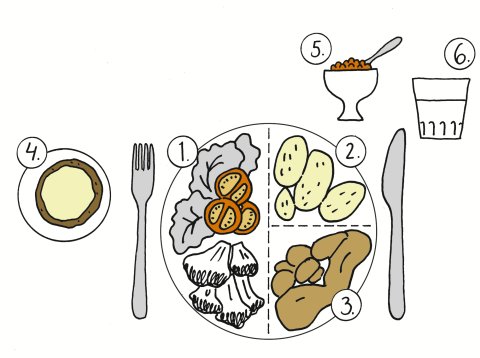
About one-half of a good meal is vegetables (1), a quarter potatoes, rice or other accompaniments (2), and a quarter meat or fish (3). Food can be enjoyed with bread (4) and as dessert berries (5), for instance. Water is a good option for a table drink (6). When trying to lose weight, the engineer leaves out the bread and accompaniment and eats more fish or meat.
Font size:
Interval:
Bookmark:
Similar books «The Engineers Cookbook»
Look at similar books to The Engineers Cookbook. We have selected literature similar in name and meaning in the hope of providing readers with more options to find new, interesting, not yet read works.
Discussion, reviews of the book The Engineers Cookbook and just readers' own opinions. Leave your comments, write what you think about the work, its meaning or the main characters. Specify what exactly you liked and what you didn't like, and why you think so.

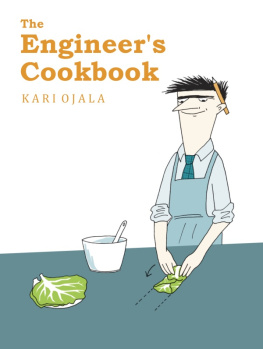






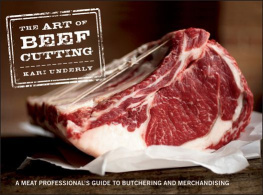
![De’Kari [De’Kari] - Voorheeze & Clarkola](/uploads/posts/book/140939/thumbs/de-kari-de-kari-voorheeze-clarkola.jpg)
